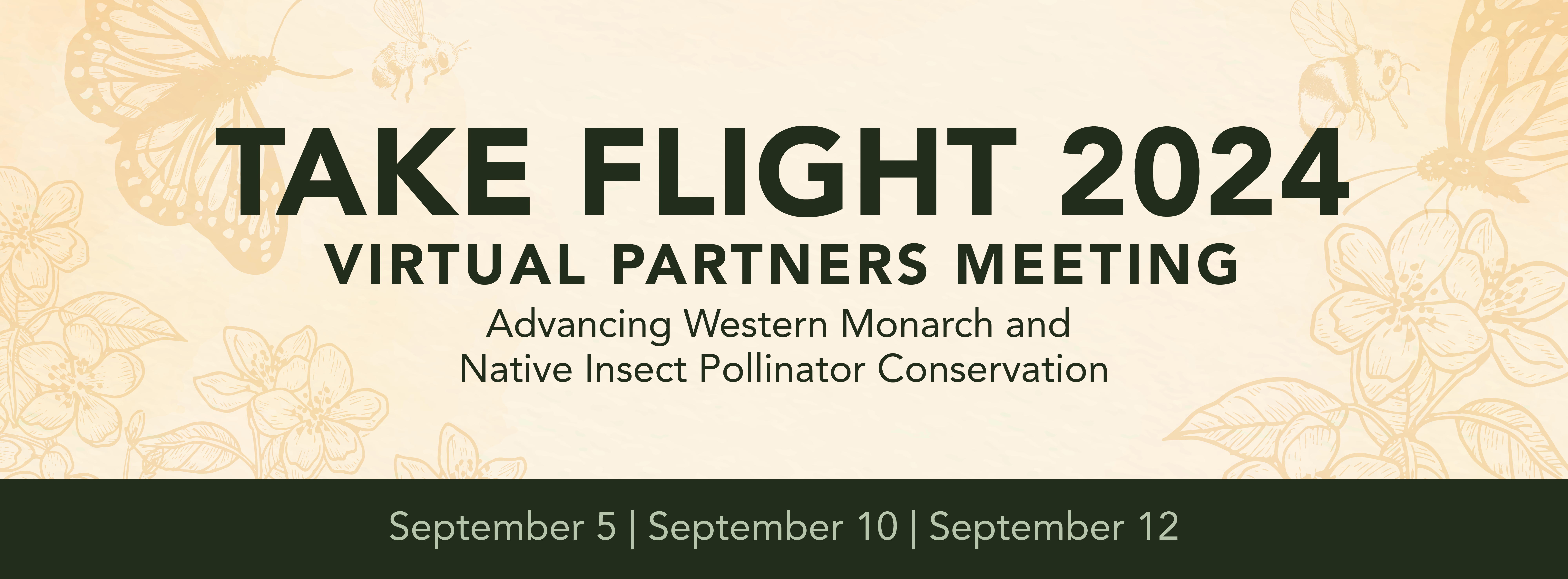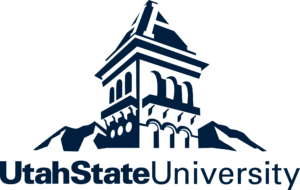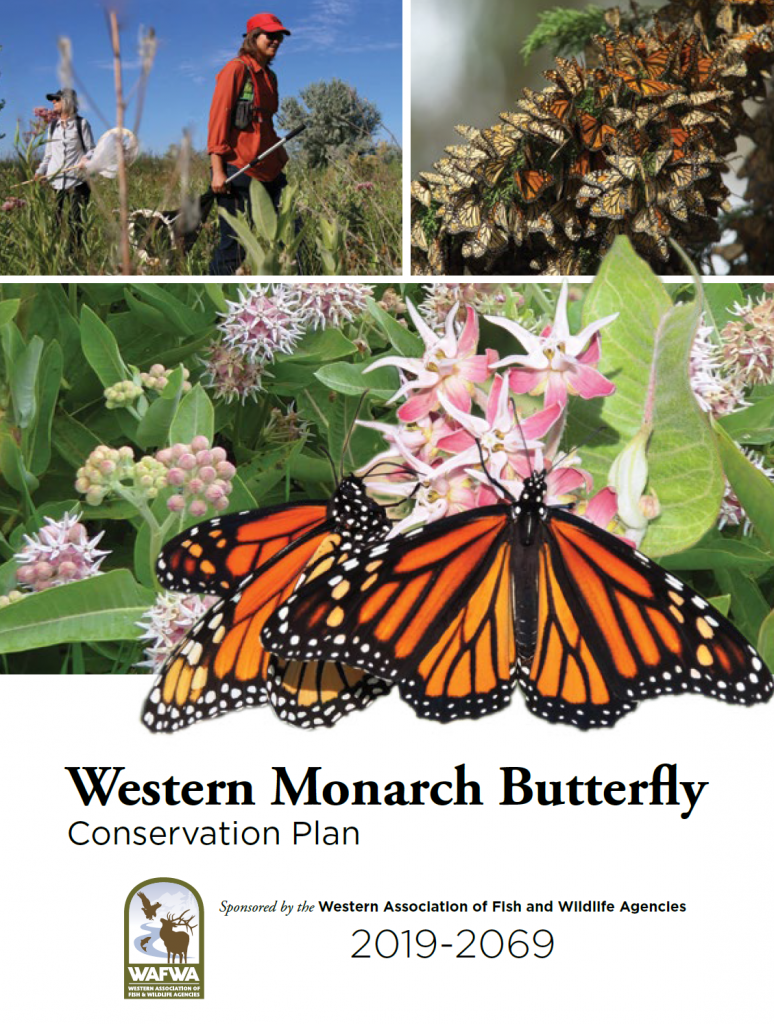Take Flight 2024 Partners Meeting

September 5, 2024 - September 12, 2024
3-day Virtual Meeting (Sept 5, Sept 10, and Sept 12)
The WMNIP Working Group will host the Take Flight 2024 virtual three-day partners meeting in September 2024. The meeting will review WAFWA Western Monarch Conservation Plan (WMCP) advancements and implementation, discuss future monarch conservation priorities and revisions, and emphasize the WMCP as a roadmap amid possible monarch listing. Additionally, it will introduce collaborative efforts aimed at regional native insect pollinator conservation beyond monarchs, including the development of a west-wide bumble bee conservation strategy."
Hosted by WAFWA’s Western Monarch and Native Insect Pollinator (WNMIP) Working Group
The WMNIP Working Group hosts the Take Flight 2024 virtual partners meeting in September 2024 to review advancements in the implementation of the WAFWA Western Monarch Conservation Plan (WMCP), discuss future monarch conservation priorities and WMCP revisions, and continue development of a west-wide bumble bee conservation strategy.
Schedule of events
This virtual meeting will span three days:
September 5, September 10, and September 12.
Each day will run from 9:00 AM – 1:00 PM Pacific Time.
Registration
$40 registration by August 16, 2024
(Limited to 200 participants)
Partnerships in WMCP Implementation:
Take Flight 2024 convenes partners representing diverse sectors to showcase collaborative efforts implementing the WMCP. Presentations will highlight best practices, lessons learned, identify barriers, and explore innovative methods for addressing key objectives in western monarch conservation.
Next Steps in WMCP Implementation and Revision:
Timed around the anticipated USFWS decision on federally listing the monarch butterfly, Take Flight 2024 includes a discussion panel with the USFWS to understand possible listing scenarios and explore next steps. The subsequent breakout sections will review the strategies outlined in the WMCP, fine-tune partner needs, and solicit partner feedback to incorporate into the upcoming WMCP 5-year revision process.
Pollinator Conservation Beyond Monarchs:
The WMNIP working group’s 3-year plan guides native insect pollinator conservation. Take Flight 2024 spotlights initiatives for mainstreaming pollinators, monitoring native bees, and assessing butterfly conservation statuses. The meeting also advances WMNIP development of a west-wide bumble bee conservation strategy. Take Flight 2024 aims to elevate issues, find common goals, and promote consistent approaches through collaborative partnerships, diverse expertise, and innovative methods to reverse native insect pollinator declines.
Encouraged Attendees:
The meeting welcomes representatives and coordinators from key stakeholder groups involved in insect pollinator conservation, habitat restoration, research, outreach, and policy development. Conservation planners and leaders from federal and Western state agencies, Tribal governments, nonprofits, agriculture, urban planning, and rights-of-way management are encouraged to attend.
A Special Thank You To Our Contributing Partners


Workshop Agenda
Take Flight 2024 Virtual Partners Workshop – Sept 5, Sept 10, Sept 12
(Draft Schedule At-A-Glance – Subject to Change)
Thursday – September 5, 2024
9:00 AM – 1:00 PM Pacific Time
- Introduction (by WMNIP Working Group chair)
- Series of Talks Highlighting Partnerships in WMCP Implementation
Tuesday – September 10, 2024
9:00 AM – 1:00 PM Pacific Time
- Western Monarch focus – Improving & Revising the Western Monarch Conservation Plan
- Short Talks; Federal Panel – Demystifying an ESA Listing (ESA 101)
- Breakout Discussions Section
Thursday – September 12, 2024
9:00 AM – 1:00 PM Pacific Time
- Other Native Insect Pollinators focus – Elevating Conservation Needs and Strategies
- Short Talks & Breakout Discussions
- State of the Butterflies of the US (SBUS)
- Bumble Bee Conservation Strategy
- Wild Bees – State of the Bees
Registration Questionnaire
In preparation for our upcoming Take Flight 2024 virtual partners meeting (Sept 5, 10, & 12), we are asking for thoughts and feedback from our partners and attendees. This brief questionnaire has two portions: 1.) questions focused on western monarch conservation and the value of the 50-year Western Monarch Conservation Plan (WMCP), and 2.) questions pertaining to native insect pollinator conservation in the West.
You will be asked to provide your responses during the registration process. The responses will be de-identified, compiled, and shared to help create a common foundation and kick off discussions. Please respond to at least one or both questionnaire portions as applicable. Your registration and questionnaire responses are due by Friday, August 16, 2024. Thank you in advance for your time and input!
1.) Does your work involve any aspects of western monarch conservation?
- What do you see as our greatest success for western monarch conservation? How does this reflect strengths in the Western Monarch Conservation Plan (WMCP)?
- In the current WMCP, what are the main gaps that should be addressed in the 2025 revision?
- Please list any updates that the WMCP should include in the 2025 revision
- What do you see as the most important area we should invest in for western monarch conservation in the next 5 years?
- What do you see as the most urgent need for western monarch conservation now?
- Given the anticipated monarch listing decision, what are your concerns in terms of conservation rules if the monarch is or isn’t listed under the Endangered Species Act?
- Please use this space if there is anything else you would like to share or expand on (e.g., capacity gaps/needs, new ideas for western monarch conservation, etc).
2.) Does your work involve any aspects of native insect pollinator conservation (aside from monarchs)?
- What are the biggest needs/concerns related to native insect pollinators from your perspective?
- What do you think are the biggest opportunities to accomplish pollinator conservation targets in the short-term (1-3 years)?
- From your perspective, what is the most significant challenge associated with successful native insect pollinator conservation across the Western region?
- At the state level?
- At the local/community level?
- What do you think are the most significant scientific gaps in pollinator conservation?
- What would you highlight as a successful partnership, project, or approach in native insect pollinator conservation that could serve as a model to other efforts?
